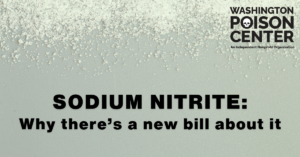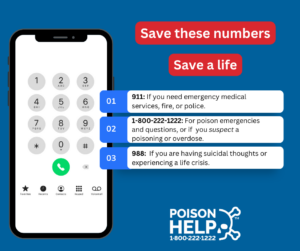
Washington state legislators are considering a bill to limit the sale of highly concentrated sodium nitrite. This chemical is commonly used as a food preservative and in labs, and is available in dangerously high concentrations, with some products up to 99% concentrated. Despite having no practical household use at such strength, sodium nitrite is easily accessible through widely used online retailers.
Poison centers nationwide have treated an increasing number of teens and young adults who used concentrated sodium nitrite in suicide attempts. In Washington, we’ve helped 11 patients since 2022, six of whom experienced severe health effects or died. Sodium nitrite can stop red blood cells from carrying oxygen to tissues and organs, leading to stopping breathing, dizziness, a fast heart rate, and death. Current nationwide estimates show an approximate 41% mortality rate, making sodium nitrite an extremely concerning substance to have easily accessible to individuals in mental and emotional distress. If Washington House Bill 1209 is signed into law, it will restrict the sale of sodium nitrite products with concentrations of 10% or higher to verified businesses only, and will require specific warning labels on the products. The next hearing for this bill will take place on March 13 in the Senate Committee on Business, Financial Services & Trade. We will be there to testify in support of its passing.
This bill is an important step in saving lives from suicide and self-harm. We’d be remiss if we didn’t acknowledge, however, that sodium nitrite comprises only a fraction of intentional poisoning cases—the CDC estimates sodium nitrite-related deaths are only 1% of deaths by suicide. What we see much more frequently are common over-the-counter and prescription medications, such as acetaminophen (brand name Tylenol®), ibuprofen, antidepressants, antihistamines (like Benadryl®), and anti-anxiety medicines. These substances are quickly and easily accessible in the home, oftentimes in large quantities.
While it’s impossible to eliminate all risks, you can help prevent self-harm and suicide by limiting access to common risks:
- Lock up all over-the-counter and prescription medications. Use a medication lockbox, a locking toolbox, a safe, or any other secured storage area. If locking up all medication is too challenging, keep a small quantity out (for example, one week’s supply) and lock up the rest.
- Dispose of any expired, unused, or unneeded medications. In Washington, we have many locations all around the state that will dispose of your medications for free every day. Find a secure medicine return location near you.
- Store guns unloaded and locked up.
- Store toxic cleaners, pesticides, and chemicals in a locked cupboard.
If you’re worried someone in your life is considering suicide or self-harm, ask them if they are thinking about killing themselves. Asking someone if they’re thinking about suicide does NOT put the idea in their head or increase their risk of attempting suicide. In fact, research shows that openly asking about suicidal thoughts can reduce risk because it provides an opportunity for the person to express their feelings, feel understood, and access help. Help them connect to support, including calling the Suicide & Crisis Lifeline at 988 or Teen Link at 1–866-TEENLINK (833–6546).
We are always here for you, 24/7/365 with free and expert help. If you’re worried about someone, don’t hesitate to call us. We can help you determine what to do next. We encourage you to also take the next step by saving these numbers in your phone so that you are ready to call and save a life.

